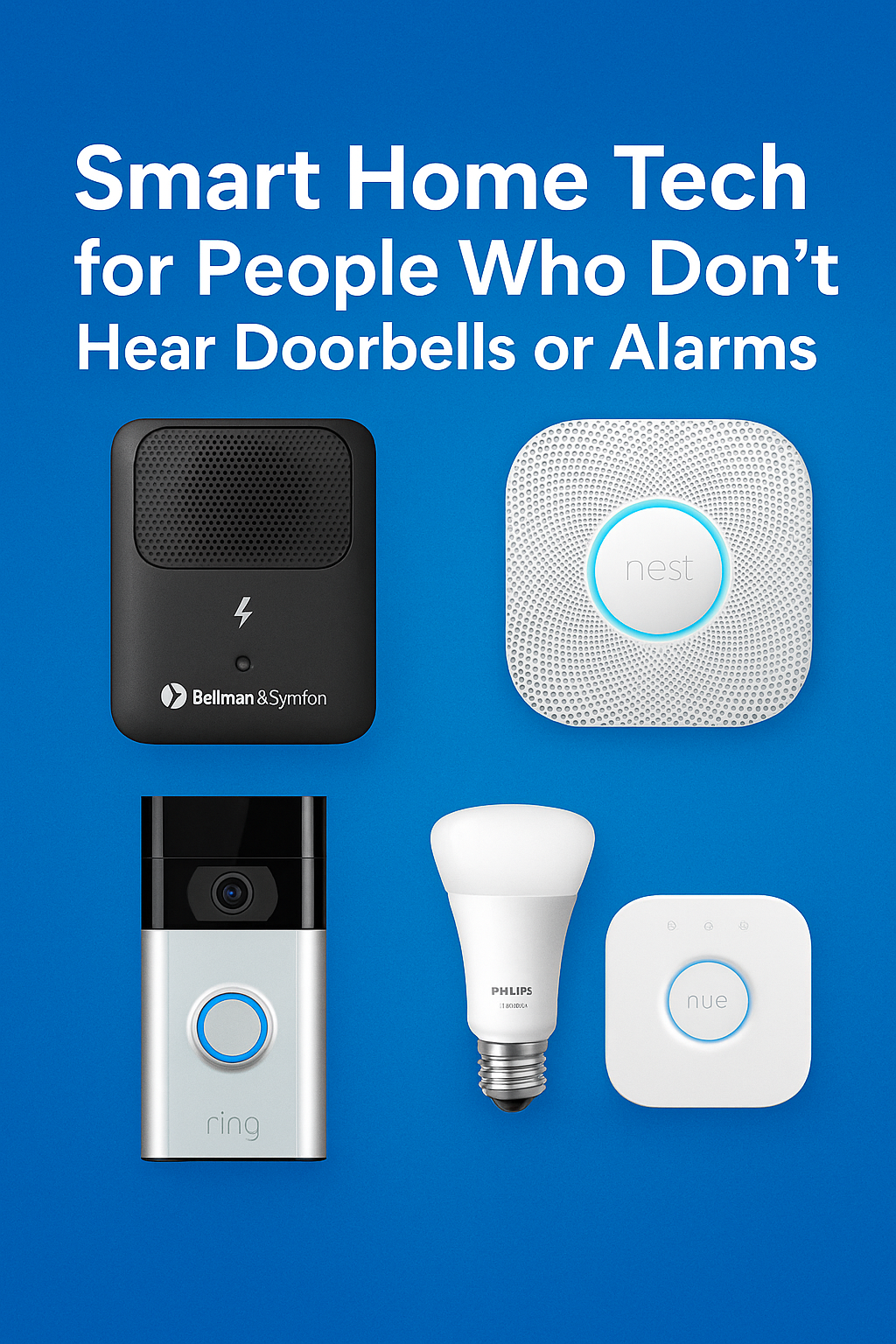For people with hearing loss, deafness, or age-related changes in hearing, missing a doorbell, alarm, or phone call isn’t just inconvenient — it can be unsafe. Thankfully, today’s premium smart home technology goes far beyond basic flashing lights.
The best systems now integrate with smartphones, work across multiple devices, and offer professional-grade reliability for peace of mind.
This guide covers the top-of-the-line smart home devices for people who don’t hear traditional alarms or doorbells.
👉 Looking for affordable options? Check out Affordable Home Alert Systems for Seniors.
👉 Want a full overview? Read our pillar guide Making Your Home More Hearing-Friendly.

Why Premium Smart Home Tech Matters
Budget-friendly devices can cover the basics, but premium systems provide:
- Whole-home safety coverage (smoke, CO, doorbells, phone, baby monitors)
- Custom notifications (lights, vibrations, smartphone alerts, and voice)
- Seamless integration with Alexa, Google Home, and Apple HomeKit
- Direct compatibility with hearing aids in some cases
- Expandable ecosystems as your needs change
If you’ve ever slept through a smoke alarm or missed an important visitor, these systems can give you the confidence that your home always has your back.

🏆 Best Smart Home Devices for People Who Can’t Hear Alarms or Doorbells
Here’s a side-by-side look at the top options:
| Product | Best For | Key Features | Amazon Link |
|---|---|---|---|
| Bellman & Symfon Visit System | Complete, professional-grade alerting | Vibrating pager, bed shaker, flashing receivers, modular coverage for smoke, phone, doorbell | View on Amazon |
| Nest Protect Smoke & CO Alarm | Smart home safety | Smartphone alerts, voice notifications, integrates with lights | Check on Amazon |
| Ring Video Doorbell Pro 2 + Chime | Security + door alerts | HD video, motion detection, phone alerts, Alexa routines with flashing lights | Shop on Amazon |
| Sonic Alert with Super Shaker | Heavy sleepers & nighttime safety | Bed shaker, bright flashes, low-frequency alarms, smartphone integration | See on Amazon |
| Philips Hue Smart Lights | Stylish visual alerts | Customizable light flashes, routines with Alexa/IFTTT, multi-room coverage | Shop Hue Starter Kit |
1. Bellman & Symfon Visit Smart Home System
The gold standard for hearing-impaired home alerting. Covers everything from doorbells and smoke alarms to baby monitors. Alerts can be delivered by flashing lights, vibrating pagers, bed shakers, or audible low-frequency tones.
- Best for: Those who want professional reliability and complete home coverage.
👉 Bellman & Symfon Visit on Amazon
2. Nest Protect Smoke & CO Alarm
Unlike traditional smoke detectors, Nest Protect sends alerts to your phone, speaks in a clear voice, and integrates with Google Home to flash smart lights during emergencies.
- Best for: Tech-savvy users already in the Google ecosystem.
👉 Nest Protect on Amazon
3. Ring Video Doorbell Pro 2 with Chime
Never miss a visitor again. Ring’s flagship doorbell provides HD video, motion detection, and integration with Alexa routines that can trigger flashing smart lights or send alerts to multiple devices.
- Best for: People who want a security upgrade plus accessibility.
👉 Ring Doorbell Pro 2 on Amazon
4. Sonic Alert with Super Shaker
A trusted name in deaf and hard-of-hearing alert systems, Sonic Alert combines intense flashing lights, low-frequency alarms, and the Super Shaker bed vibrator to ensure you wake up during emergencies.
- Best for: Nighttime alerts and heavy sleepers.
👉 Sonic Alert System on Amazon
5. Philips Hue Smart Lighting
Philips Hue lights are not dedicated alert systems, but when integrated with Alexa or IFTTT, they can flash in different colors for doorbells, alarms, or phone notifications. Imagine your living room glowing red for fire alarms or blue for doorbells.
- Best for: People who want visual alerts without bulky equipment.
👉 Philips Hue Starter Kit on Amazon
How to Choose the Right Smart Home Tech
When making your decision, ask yourself:
- Do you need dedicated alert coverage (Bellman & Symfon) or prefer a flexible ecosystem (Nest, Ring, Hue)?
- Will you rely mostly on visual cues (flashing lights) or need vibrations for nighttime safety?
- Do you want phone alerts when away from home?
- Are you already using Alexa, Google Home, or Apple HomeKit?
🔎 Frequently Asked Questions (FAQ)
Q: What is the best smart home system for people who are deaf or hard of hearing?
A: The Bellman & Symfon Visit System is the most complete and reliable solution. For those who prefer smart ecosystems, combining Nest Protect, Ring Doorbell, and Philips Hue lights creates strong multi-layer coverage.
Q: Can Alexa or Google Home flash lights for alerts?
A: Yes. With Philips Hue or other smart bulbs, you can set up routines so Alexa or Google Home flashes your lights when the doorbell rings, an alarm sounds, or a motion sensor is triggered.
Q: Do these systems work with hearing aids?
A: Some hearing aids connect with smartphones, so you’ll receive push alerts directly in your hearing aid apps. For nighttime coverage, however, bed shakers or flashers are still recommended.
Q: Are premium systems worth it compared to cheaper ones?
A: Yes, if safety and reliability are priorities. Budget systems may cover single-use alerts, while premium systems provide whole-home, multi-sensory coverage.
Final Thoughts
If you live with hearing loss, deafness, or age-related changes in hearing, premium smart home tech can make your daily life safer, easier, and more connected.
- For the most reliable coverage, choose a dedicated system like Bellman & Symfon.
- For a flexible smart home upgrade, combine Nest Protect, Ring Doorbell, and Philips Hue lights.
For a complete home safety strategy, read:
✅ Next Step for You: Decide if you want a professional alerting system or a smart home ecosystem, then start with the device that solves your biggest daily concern — whether that’s a missed doorbell, unheard alarm, or nighttime safety.

